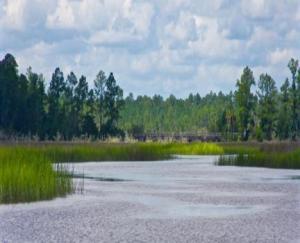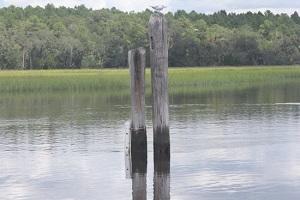
Georgia Water Quality Standards
Clean Water Act Goals & Objectives

The objective of the Federal Clean Water Act (CWA) is to restore and maintain the chemical, physical and biological integrity of the Nation’s waters, and to achieve wherever attainable, the goal of providing for the protection and propagation of fish, shellfish, wildlife, and providing for recreation in and on the water. Water quality standards are a key tool used by States to meet these goals and are a fundamental component of watershed management. Water quality standards are the foundation for numerous activities conducted by Georgia EPD including development of Total Maximum Daily Loads (TMDLs), issuance of National Pollutant Discharge Elimination System (NPDES) permits, and assessment of State waters as part of the 305(b)/303(d) listing process. The Board of Natural Resources establishes rules and regulations to protect Georgia’s surface water, the health of the people who use the water, and the aquatic life in the water.
Water Quality Standards
Water quality standards, found in Georgia’s Rules and Regulations for Water Quality Control (Chapter 391-3-6-.03), are made up of three components:
1. Designated Uses that establish the environmental use of the waterbody. There are six designated uses in Georgia including:
(a) Drinking Water Supplies
(b) Recreation
(c) Fishing
(d) Wild River
(e) Scenic River
(f) Coastal Fishing
Designated uses are established for all waters in the state. From time to time, EPD revises the designated use(s) of a waterbody based on updated information and stakeholder input. EPD has developed guidance for recommending a change in the designated use of a waterbody.
EPD revised the guidance document for recommending a change in designated use and held a public meeting on February 25th 2022, to receive input from interested stakeholders. EPD posted the final version of the "Guidance for Recommending a Change in Designated Use" and associated submittal documents on March 16, 2022.
-
Presentation from Designated Use Change Guidance Document Discussion Meeting - February 25, 2022
- View the
Guidance for Recommending a Change in Designated Use – March 16, 2022
- View the
Initial Nomination Form ,
Recreation Location Data Template , and
Final Nomination Package Checklist
2. Numeric and Narrative Criteria protect the designated uses. Georgia has general criteria that apply to all waters of the State, which include both narrative and numeric criteria, and specific criteria that support a water’s designated use. Specific criteria are for dissolved oxygen, pH, temperature, and bacteria. In addition, specific numeric criteria for lakes are for nutrients, chlorophyll-a, and pH.
View
a summary table of specific water quality criteria.
3. Antidegradation Policy protects and maintains the state’s water quality from new or expanding dischargers.
Information on Georgia’s antidegradation implementation is given in the
Antidegradation
Implementation Guidelines
, which may prompt new or expanding dischargers to use the Antidegradation Analysis Form (Industrial), the Antidegradation Analysis Form (Domestic), &/or the Wasteload Allocation Request form. These forms and other helpful documents about permits for both industrial and domestic facilities are provided here.
Water Quality Standard Approval
In compliance with 40 CFR 131.21 (aka The Alaska Rule), state’s water quality standards must be approved by EPA before they are used for activities authorized by the Clean Water Act (such as issuing wastewater permits, drafting TMDLs, and assessing waters). Georgia’s water quality standards that are adopted by the Georgia Board of Natural Resources can be found on the Secretary of State’s website. These rules may or may not have been approved by EPA. This is a consequence of the process for the adoption of water quality standards, which is as follows:

- Standards are adopted by the Board of Natural Resources after which they are filed with the Secretary of State’s office.
- The Secretary of State posts the newly adopted Rules on their website.
- Georgia EPD must obtain the State Attorney General’s certification that the standards were adopted in accordance with State law.
- Finally, standards are sent to U.S. EPA for approval for Clean Water Act purposes. It can be many months between the time standards are adopted by the Board of Natural Resources and U.S. EPA approval is granted.
Latest
EPA approved version of Georgia’s water quality standards
EPA’s approval on August 31, 2022, followed adoption by the Board of Natural Resources on January 28, 2022.
EPA Approval
Letter - August 31, 2022
EPA
Approval Decision Document – August 31, 2022
Triennial Review
The Clean Water Act section 303(c) and Federal Regulation 40 §CFR 131.20 requires Georgia to review and revise its water quality standards from time to time, but at least once every three years. This process, which revises water quality standards every 3 years, is known as the Triennial Review.
2025 Triennial Review
Georgia EPD initiated the 2025 Triennial Review with a
public
notice distributed on February 7, 2025
. An opening public hearing was held on Monday, March 31, 2025, via the Zoom web conferencing platform. During the hearing, EPD presented items being considered for the 2025 triennial review. Attendees had the opportunity during the hearing to provide comments and recommend topics for EPD to consider. Written comments are currently being accepted. EPD will hold public and stakeholder meetings on specific topics over the upcoming year. Nominations for designated use change for the 2025 triennial review should be submitted by April 1, 2026.
-
Presentation from 2025 Triennial Review Opening Hearing – March 31, 2025
2022 Triennial Review
EPD held a virtual public meeting on Monday, April 21, 2025, at 10:00 am to discuss revisions to the proposed amendments to Georgia’s Water Quality Standards. This virtual public meeting focused on the revisions made to the proposed rule amendments since the last public meeting (October 7, 2024) and associated public hearing (January 28, 2025) based on feedback received from the U.S. Environmental Protection Agency (EPA).
-
Presentation from 2022 Triennial Review Postponement and Updates Public Meeting – April 21, 2025
-
4/21/2025 Public Meeting Notice – 3/21/2025
- The
Revised Draft of Proposed Rules 391-3-6-.03 – 4/8/2025
- The supporting technical document “
Updated Human Health Criteria Technical Support Document ” describes development of proposed human health criteria with the use of probabilistic risk assessment. (Revised 4/9/2025)
- The supporting technical document “
Lakes Burton, Rabun, and Tugalo: Proposed Criteria Technical Support Document ” describes development of the site-specific lake standards. (Revised 4/8/2025)
- The supporting technical document “
Designated Use Change Technical Support Document ” describes the decision-making process used by EPD for updating 11 waterbody segments to include Recreation designated use and 7 waterbody segments to include Drinking Water designated use.
Presentation
from Triennial Review Public Meeting - October 7, 2024
The changes being proposed are adoption of EPA’s recommended aquatic life criteria for diazinon, nonylphenol, and selenium, revised human health criteria for 88 pollutants, adoption of site-specific criteria for Lakes Burton, Rabun, and Tugalo, revision of the designated uses to change 11 waterbody segments to recreation and 7 to drinking water, and inclusion of "natural condition" dissolved oxygen criteria for Fishing, Recreation, and Drinking Water Supply designated uses.
Updated
Draft of Proposed Rules 391-3-6-.03 – 10/04/2024
Draft
of Proposed Rule 391-3-6-.03 – 09/06/2024
Notice
of Public Meeting on 10/07/2024 for Updates on Triennial Review of Water Quality Standards
Among the changes being proposed are adoption of EPA’s recommended aquatic life criteria for diazinon, nonylphenol, and selenium, updated human health criteria for 83 pollutants and new human health criteria for 5 pollutants, adoption of site-specific criteria for Lakes Burton, Rabun, and Tugalo, revision of the designated uses to change 11 waterbody segments to recreation and 7 to drinking water.
The comments received to date and EPD’s responses are summarized in the PDF document below
Comment
Response Summary – 09/06/2024
EPD held a virtual public meeting on Wednesday, February 7, 2024, at 11:00 am to discuss human health criteria values being proposed for the 2022 Triennial Review. Meeting details and an attached table of criteria values can be found on the
public
notice distributed on January 2, 2024
.
Table
of Proposed values for 83 existing criteria and 11 new criteria
Presentation
from Human Health Criteria Public Meeting - February 7, 2024
Recording of the February 7, 2024 Human Health Criteria Public Meeting
EPD held a virtual public meeting on Wednesday, March 15, 2023, at 11:00 am to discuss the risk targets associated with the human health criteria updates being evaluated for the 2022 Triennial Review. Meeting details were sent out in a
public
notice distributed on February 13, 2023.
Presentation
from Human Health Criteria Public Meeting – March 15, 2023
EPD held a virtual public meeting on Wednesday, September 21, 2022 at 11:00 am to discuss the human health criteria updates being evaluated for the 2022 Triennial Review. Meeting details were sent out in a
public
notice distributed on August 19, 2022
.
Presentation
from 2022 Human Health Criteria Public Meeting – September 21, 2022
Georgia EPD initiated the 2022 Triennial Review with a
public
notice distributed on January 27, 2022
. An opening public hearing was held on Tuesday, March 22, 2022 via the Zoom web conferencing platform. During the hearing, EPD presented items being considered for the 2022 triennial review. Attendees had the opportunity during the hearing to provide comments and recommend topics for EPD to consider. Written comments were accepted through April 1, 2022. Additional meetings and public hearing(s) will be held throughout the Triennial Review process to allow the public additional opportunities to provide input. Future announcements and materials related to the 2022 Triennial Review will be posted here. Please sign up for our Water Quality Standards, TMDLs, and Grants mailing list here to receive future announcements directly to your inbox.
Presentation
from 2022 Triennial Review Opening Hearing
– March 22, 2022
2019 Triennial Review
As required by federal law and regulation, Georgia EPD initiated the 2019 Triennial Review with a public notice distributed on January 7, 2019. An opening public hearing was held on February 26, 2019. Additional public meetings for the Triennial Review Process were held to allow the public further opportunities to provide input and the presentations made at the various meetings and hearing(s) can be found below. A final public hearing was held on Tuesday, December 13, 2021 to provide the public a final opportunity to comment and offer input on the proposed rule amendments. The rule amendments were adopted by the DNR Board on January 28, 2022 and were certified by the Secretary of State and Attorney General before being sent to EPA for approval on April 1, 2022. EPA approved the rule amendments on August 31, 2022.
Presentation
from 2019 Triennial Review Public Meeting
– September 13, 2021
Presentation
from Chattahoochee – N. Highland Dam to Bull Creek - Designated Use Change Stakeholder Meeting
– July 21, 2021
Presentation
from Chattahoochee – Pea Creek to Snake Creek - Designated Use Change Stakeholder Meeting
– June 29, 2021
Presentation
from Designated Use Change Public Meeting
- June 17, 2021
Presentation
from Triennial Review Update Public Meeting
- February 17, 2021
Presentation
from Designated Use Change Stakeholder Meeting
– February 2, 2021
Presentation
from Opening Hearing of the 2019 Triennial Review
– February 26, 2019

The technical documents to support the 2019 Triennial Review can be found here:
- View the
public notice ,
proposed rule amendments , and the
synopsis and statement of rationale .
- The supporting technical document “
Lakes Oconee and Sinclair: Proposed Criteria Technical Support Document ” describes development of the site-specific lake standards.
- The supporting technical document “
Bacteria Criteria for Drinking Water and Fishing Designated Uses ” describes development of the proposed bacteria criteria for secondary recreation waters during non-recreation season.
- The
Draft Guidance for Changing a Designated Use .
- The supporting technical document “
Recreation Designated Use Change Technical Support Document ” describes the decision making process EPD used for changing the designated use of 14 waterbodies to recreation.
Water Quality Standards Development Plans and Guidance Documents
| Information | Links |
|---|---|
| Georgia has developed a mutually agreed upon strategy for adopting nutrient water quality standards. |
|
| EPA, GA EPD, and SC DHEC have collaborated on a report intended to provide technical support in developing and establishing numeric nutrient criteria to support applicable designated uses in the states’ estuaries. |
|
| Outstanding National Resource Water (ONRW) is a designation granted to waters afforded the highest level of protection under Tier 3 of the antidegradation policy. This designation is considered for waters of exceptional ecological, recreational, aesthetic, or historic significance. Existing water quality shall be maintained and protected, and where feasible improved. GA EPD has developed procedures for recommending ONRWs. |
|
NPDES Permitting Strategies
| Information | Links |
|---|---|
| Georgia EPD has developed strategies to address implementation of total phosphorus and ammonia in NPDES permitting. | |
| Georgia EPD has developed a strategy to address the implementation of changes to the bacteria criteria for water quality standards and NPDES permitting (Bacteria Strategy). |
|
| In September 2023, EPD finalized Georgia's roadmap for the development of a comprehensive Nutrient Reduction Strategy for point and nonpoint source discharges. This document builds upon a draft roadmap document that went through public review and feedback beginning in 2022. This document addresses existing laws, guidance documents, and permitting strategies, as well as EPD's proposed actions and timelines for revising or developing various related strategies and plans. |
|